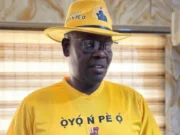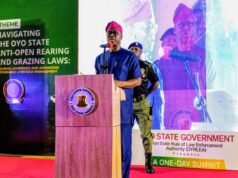Positive Change Trailblazer Initiative, a non-governmental organization concerned about democracy and development in Nigeria, held a symposium to mark the country’s 64th Independence Anniversary in Ibadan on Wednesday.
At the event, held at the University of Ibadan under the theme: The Need for Deeper Reflection and Orientation Shift, various scholars analyzed and proffered solutions to some of the most critical issues confronting the country, six decades after it gained independence from Britain.
In his presentation at the event, one of the keynote speakers, Hakeem Yussuf, a Professor of Global Law at the University of Derby, noted that some of the country’s biggest problems today can be traced to the presence of remnants of colonialism in its political system.
“The delay in the trial process of cases forming part of transitional justice measures is due mainly to the exploitation of a very weak criminal justice system, which remains largely unreformed since the colonial era. The colonial government made ‘received English law’ a source of law in the Nigerian legal system,” he said.
Speaking further, he noted that “even the civilian administration of Obasanjo had been installed by his retired military colleagues. These colleagues had either led or were part of some of the most repressive military regimes in the country. Indeed, Obasanjo’s Cabinet at the time (1999–2003) was composed of some of those ex-military rulers who would have been implicated in such a revelatory venture.
“The administrative was directed at protecting the new civilian regime rather than ensuring institutional reform and ridding the military of violators of human rights. These appointees’ sensitive Cabinet positions sent the signal that the administration had a securitized disposition as opposed to a human rights-sensitive approach to governance.
“Equally relevant is the preference for an administrative application of the lustration policy devoid of any direct or specific legislation. The implementation of the lustration policy by both regimes reinforced a longstanding tradition of authoritarian governance lacking in democratic consultation or legislative input by parliament on critical issues affecting general well-being.
“This is rooted in the colonial-style governance that has been dominant in the country’s contemporary history, and has been the standard approach to transitional justice in the postcolony as a governance project. The circumstances of the judiciary, trials and limited application of lustration raise wider issues of institutional legacies from the colonial experience at the point of independence in government institutions from the civil service and security agencies to the military and intelligence services, the police and so on,” he noted.
In his own speech, the second keynote speaker, Professor Ismail Azeez of the department of Forestry and Rural Learning, University of Ibadan, who spoke on the topic: Better Society: A Call To Action, emphasized the need for the country to add value to its natural resources to trigger economic prosperity.
“We have natural resources. Natural resources are not useful until value are added to them, and what we need is a youth system that could add value to that resources so that we can generate more from this renewable natural resources. What is presently happening is that this renewable natural resources are being exported out of our country, to foreign industries, which is wrong,” he was quoted saying.
“If we genuinely want development, we need a mindset that is different, that is value addition, oriented to this renewable natural resources, and that is but the positive thing about it is that, yes, don’t look at our youth as a wasted generation. Yeah, we have some of them that are bad. We have some that are busy working positively. They are and they are moving fast.
“And like I said, you want to remove dust from someone’s eyes, please. First of all, look at the possibility of removing that land log in your own eyes. For you to change someone else, you must be good yourself. Our children don’t ask us questions, they don’t talk to us, they are studying us, and it is what they are getting from us that they are acting on, which is what we as individuals must try as much as possible to address,” he added.
Speaking with journalists at the event, the organization’s founder, Engr. Akeem Aderinto noted that the initiative started in 2016 with the slogan “Change Begins with You” to involve ordinary people in driving change and has since grown from a WhatsApp group to a registered organization with over 300 members.
He explained that the organization is convinced that true independence requires a change in mindset and behavior and this explains why its core message has been working on orienting the masses, especially from the grassroots, through various initiatives.




































